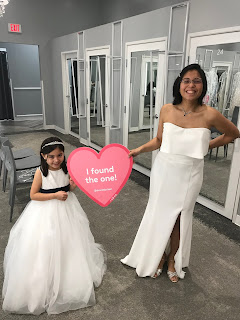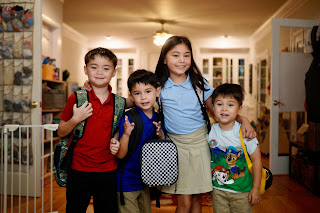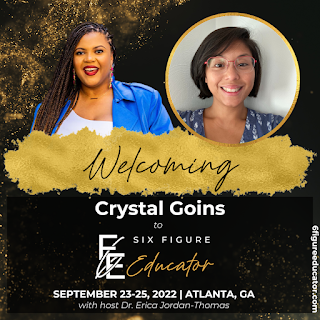The Unspoken Reality: Social and Emotional Learning Matters
Dear Readers-
Ben and I are renewing our vows and having another "wedding" with our kids. So, Reagan and I went shopping and found our dresses! I remember asking her, "Reagan, are you excited?" She said "Mommy, I don't know. What do you want me to feel?" Her response made my heart drop.
Today, even our kids know the weight of insecurity and seek approval at all times. Man, I just wanted to shake her and say FEEL whatever you want to feel. However, once we started looking and trying on dresses, I was acting and saying the same things to our friend and my fitting consultant.
How sad our insecurities and emotions can get the best of us. In the picture above, in mind and heart, my daughter and I are equally the same.
To truly live life and have successes- you have to be socially and emotionally equipped to respond appropriately to these situations or it can taunt you for the rest of your life.
Honestly, this is how I mostly relate to children.
This is why my teaching is so effective.
According to Learning in Social and Emotional by Nancy Frey, Douglas Fisher, and Dominique Smith (2019)- Social Emotional Learning covers five components:
1. Identity and Agency- strength recognition, self-confidence, self efficacy, growth mindset, perseverance and grit, and resiliency
2. Social Skills- prosocial skills, sharing, teamwork, relationship building, communication, empathy, and relationship repair
3. Cognitive Regulation- metacognition, attention, goal-setting, recognizing & resolving problems, help-seeking, decision making, and organizational skills
4. Emotional Regulation- Identifying emotions, emotional self-perception, impulse control, delayed gratification, stress management, coping
5. Public Spirit- respect for others, courage, ethical responsibilities, civic responsibilities, social justice, service learning, leadership
As a child, I struggled with social anxieties and always felt "shy" and overwhelmed in big groups of people. Grade School. Middle School. High school- all the same.
Today, you would never know that was true.
To get this far...
I've had to learn how to literally survive life's changes.
The more personal and vulnerable the experience, the more long-lasting the change.
I may be smart, but I never liked to read. I just LOVE to think and figure things out.
I learn best through old fashion trial and error- where I am able to question, make observations, and explore my curiosities.
I am very EMOTIONAL -all the time- but I'm not shameful of it NOW. When I was a child, I was shamed for it quite often because it wasn't always a socially acceptable response. Now, it's hard to truly calm down a child if you don't validate or recognize the feeling he/she is communicating to you.
Identifying emotions interpersonally is how some people are first heard and accepted.
I happen to be one of those type of people.
So, I do well intervening with emotionally-needy students.
When counseling college students and teens, I had made so many connections between their struggles and my own. Some of their struggles would be struggles I still faced as an adult woman in my heart and mind. Then, when I had kids, I saw some of the same struggles coming out of them that both the teens and I have had to struggle with in our pasts.
This is why I vowed to be different and teach other things coming back into the classroom. So, whether academically successful or not, a child could feel genuinely valued even just for one year.
I started integrating things like positive self-talk; principles of hard work and growing up; respectful and responsible habits; and teamwork.
Each year, I limit more and more how much and how often I reward students. I try to put more energy and emphasis on structure and boundaries: a realistic schedule and built in procedures, consequences, and privileges to parallel incentives they might find in the real world.
I'm exploring thematic units for Mindful Mondays. My first couple of months we studied "Grit"- hardwork and perseverance to reach a long term goal. For my next unit I want to tackle and plan on "Effort."
Each year, I learn something new and adjust according to the cohort I am given. So far, this year,
I've encountered lots of heavy needs such as appropriate conversational talk, friendship etiquette, and conflict resolution. Unfortunately, I also see a lack of respect for classroom materials and shared supplies. I teach Kindergarten and year after year- there's a huge decline in fine-motor skills. Kids are too busy swiping and playing video games, they don't really know how to hold a pencil or have control with their pencil if they do come with some prior knowledge.
Because of these things, we've had to do more pencil and paper independent work and only supervised play with hands on materials whether that be monitored by us walking around or teacher-led at the small group table.
In this approach,
it's a constant "community project" where we all learn from each other.
For me, it's a more humane way of teaching instead of driving our kids towards just testing and productivity. Maybe, with more of a focus on social emotional learning, children would feel more whole again as they are pushed through systems that don't developmentally align.
Thanks for Reading!
Love. Always,
Crystal



Comments
Post a Comment